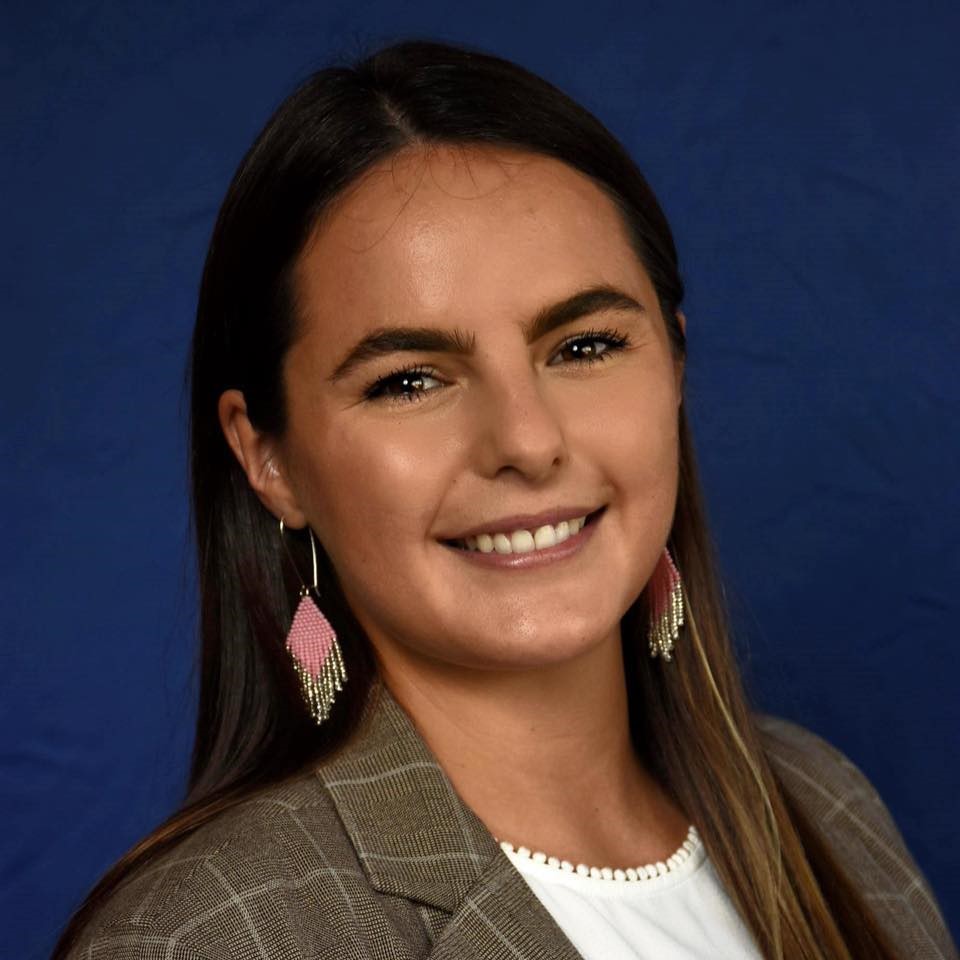Exemplary student to pursue career in tribal law
Aidan Graybill, L’21, decided to become a lawyer to pursue her dream of advocating for Indian tribes. Three years later, Graybill is turning her dream into reality.
Graybill’s legal ambitions brought her to the University of Kansas School of Law, where she studied tribal law and federal Indian law. Graybill is a member of the Wyandot Nation of Kansas, which is based in Kansas City, Kansas.
In May, Graybill will graduate with a J.D. from KU Law and a M.A. in Indigenous studies from KU’s College of Liberal Arts and Sciences. After taking the bar this summer, Graybill will serve as a fellow for a tribal government she designed with the tribe to make a positive impact on the community. Graybill is also currently serving on the executive council and constitution committee for her tribe, and will continue to do so after graduation.
“I’m excited to see where my experiences take me, and I am looking forward to finally using my education to help whatever communities are in need of what I am able to provide to them,” Graybill said.
At graduation, Graybill received the Janean Meigs Memorial Award in Law. The award is given to a student who has demonstrated a caring spirit in service to the students of the law school or to the community at large.
During the 2020-21 academic year, Graybill served on the National Native American Law Students Association Board as the Area 3 representative and co-chair of the organization’s advocacy committee.
“Serving on the NNALSA board was a hugely transformative experience,” Graybill said. “I was able to make connections with other Native law students across the U.S. and network with other Native lawyers on a national level, which I feel will definitely help me transition out of law school and into my professional career.”
Graybill had the opportunity recently to participate in an event hosted by the Smithsonian’s National Museum of the American Indian. She was interviewed alongside Kansas House Rep. Christina Haswood for the event “Youth in Action: Native Women Making Change,” which was held in March.
“We were both interviewed by the National Museum of the American Indian about our participation as young Native women in the law and in state government, and the roles we play in order to serve our communities and society at large,” Graybill said.
While in law school, she was actively involved with the Tribal Law & Government Center. Graybill earned the Tribal Lawyer Certificate, participated in the Tribal Judicial Support Clinic, served as president of KU’s Native American Law Students Association and competed in the National Native American Law Students Association (NNALSA) moot court competition twice.
“Through the Tribal Judicial Support Clinic, I was able to observe the work a general counsel for a tribe does, which was some of the best real-world experience I could have received,” Graybill said. “It really solidified for me that the area of law I was pursuing was right for me.”
Through the school’s Criminal Prosecution Field Placement Program, Graybill interned for the Prairie Band Potawatomi Nation’s tribal prosecutor in Mayetta, Kansas.
“I worked for a tribal prosecutor and was able to observe court hearings and interact with the tribal court administrators and judges,” Graybill said. “It was just such an incredible community to be a part of even just briefly. The support I got through clinical programs has really carried me through law school because it reminded me of why I came here.”
Graybill also served as president of the Mindfulness in Law Society, ABA representative for the Student Bar Association, and treasurer for Women in Law. She was also a member of the Dean’s Diversity Leadership Council, Public Interest Law Society and American Constitution Society.
Graybill said the experiential learning opportunities at KU Law have prepared her to enter the workforce.
“I was able to expedite the process of a lot of things I learned in my classes by having to put them into practice. For example, I learned quickly that memos we had weeks to do in lawyering classes were usually due in a day or two,” Graybill said. “Because I’ve written so many memos while earning experiential credit, those things come quicker and easier to me now and I am able to better serve my supervising attorneys.”
Graybill – who is from Scottsdale, Arizona – earned an undergraduate degree in anthropology from the University of Nebraska-Lincoln in 2017. She also earned minors in political science and biology.
She is the third person in her family to earn a degree at the University of Kansas. Her grandfather, Harry Owen Ogg, graduated from KU in 1957. Her mother, Jolie Ogg Graybill, graduated in 1987.
— By Ashley Golledge
This post is the first in a series highlighting a few of the exceptional members of KU Law’s Class of 2021. Stay tuned for more profiles as we celebrate this year’s graduating class.
